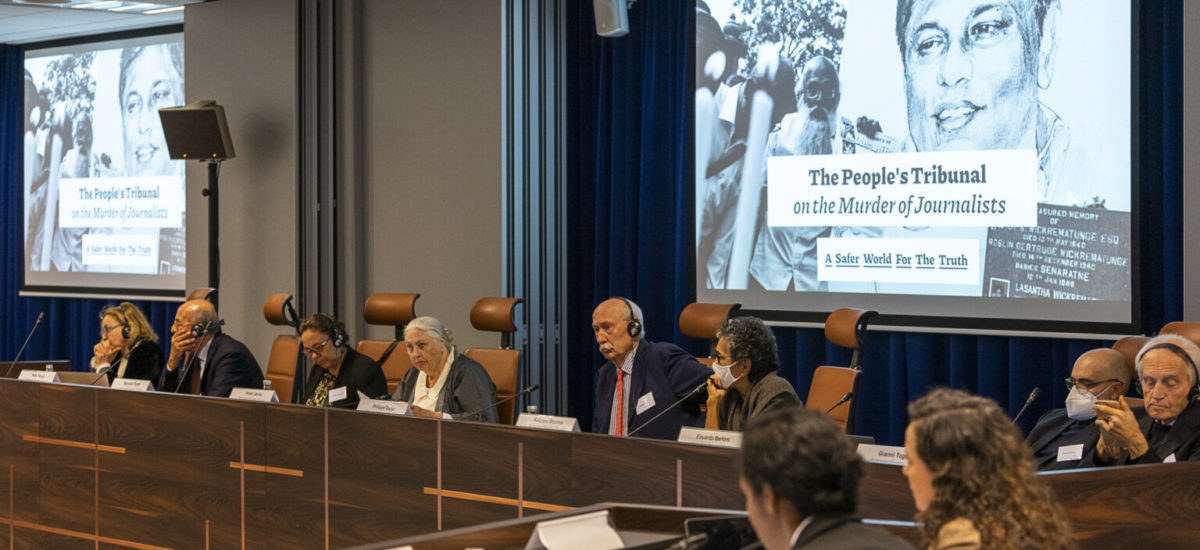Photo courtesy of People’s Tribunal on the Murder of Journalists
Since 1992 at least 1,400 journalists have been killed for bringing reliable information to the public. These murders, and the subsequent impunity, are the ultimate consequence of a hostile environment for press freedom characterized by harassment, violent attacks or other attempts at silencing journalists, according to A Safer World For Truth, an initiative by Free Press Unlimited, Committee to Protect Journalists and Reporters Without Borders that set up the People’s Tribunal on the Murder of Journalists.
Sri Lanka is one of the countries that has seen the murder of many journalists in the past several decades while others have been forcibly disappeared, assaulted, threatened and intimidated under different governments. There has very little progress in pursuing justice for these crimes and not a single person has been convicted.
Sri Lanka, along with Mexico and Syria, was one of the countries to face the tribunal. While it has no legal powers to convict anyone, the tribunal aims to raise awareness, pressure governments and gather evidence. After nearly a year of hearings and over fifty witness testimonies from relatives, journalists and experts, the tribunal delivered its verdict on September 19, where the Sri Lankan government was found guilty of “grave violations of the international human rights of journalist Lasantha Wickrematunge, specifically the right to life, the right to freedom of expression and the right to an effective remedy.”
“In view of the overwhelming and compelling evidence … the states of Mexico, Sri Lanka and Syria are guilty of all the human rights violations brought against them in the indictment,” said Eduardo Bertoni, a professor at Buenos Aires University School of Law and one of the tribunal’s nine self-appointed judges. None of the governments submitted any defence.
The tribunal provided relatives of murdered journalists with a way to be heard by (re)opening domestic criminal proceedings and promoting advocacy efforts. It had trials with witnesses, experts, prosecutors and judges to draw attention to journalist killings that have eluded justice.
“With the Tribunal, we not only wanted to set an example for states, but also offer a platform for anyone suffering from the unsolved murder of a journalist,” said Ruth Kronenburg, Director, Free Press Unlimited.
“This judgement has given renewed strength and hope to me and I see it not only as a victory for families like ours hoping for justice for their loved ones but a clear message that perpetrators of such crimes cannot evade justice.” said Lasantha’s daughter Ahimsa Wickrematunge.
“Safe, free and enabling environment for independent journalism and freedom of expression and opinion is crucial as Sri Lankans grapple with the massive economic crisis and seek radical political reform. For this, accountability for serious crimes against journalists is essential. While recognizing that much of these struggles must continue to be waged in Sri Lanka, we also recognize the importance of international attention and support, and hope the Peoples Tribunal will be able to make a significant contribution towards this,” said a statement from prominent human rights organisations and individuals in support of the tribunal.
On the first day, the Prosecutor heard witnesses speaking on impunity for crimes against journalists in Sri Lanka. They testified on specific groups of journalists at risk, impunity for crimes against journalists and the role of the state in the prevention and investigation of these crimes.
The second day was dedicated to the murder of Lasantha Wickrematunge. The Prosecutor presented the evidence collected and heard witnesses who spoke about Lasantha Wickrematunge’s life and work, the circumstances of his death and the state investigation of the murder.
Several prominent Sri Lankans including Dr. Paikiasothy Saravanamuttu executive director of the Centre for Policy Alternatives, Bashana Abeywardana from Journalists for Democracy in Sri Lanka, Sandya Eknaligoda wife of disappeared journalist Praneeth Eknaligoda and journalist Dilrukshi Handunnetti gave testimony at the hearings.
Giving his evidence on May 13, former detective of the Criminal Investigations Department, Nishantha Silva, linked Mr. Gotabaya Rajapaksa to the murder of journalist Lasantha Wickrematunge. Mr. Silva believed that Mr. Rajapaksa – then Secretary of Defense – had the means, the opportunity and a clear motive for killing Lasantha Wickrematunge to prevent the journalist from testifying against him in court.
Mr. Rajapaksa has denied any involvement in extrajudicial killings, abductions and disappearances.
The Prosecutor noted that particularly in the last months of the war and the aftermath the government, under the leadership of Mahinda Rajapaksa as President and Gotabaya Rajapaksa as Secretary of Defence, authorized attacks on journalists including abductions, assaults, torture and killings. The Rajapaksa regime arrested, deported and sued journalists and attempted to enact laws and regulations limiting the free press, he said.
View this post on Instagram


